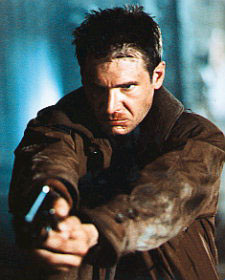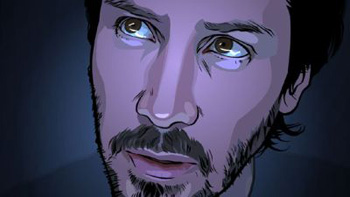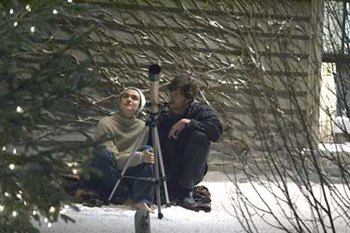 Hello, everyone! After a bit of a hiatus, this sucker’s back. I’ve gotten a few more submissions (to those who haven’t heard from me, I apologize. You will soon enough.), so thankfully it seems that the ship will stay afloat for at least a little while longer. So keep ’em coming, folks. This is your baby afterall.
Hello, everyone! After a bit of a hiatus, this sucker’s back. I’ve gotten a few more submissions (to those who haven’t heard from me, I apologize. You will soon enough.), so thankfully it seems that the ship will stay afloat for at least a little while longer. So keep ’em coming, folks. This is your baby afterall.
Now, let’s sit back and allow our man Geoff to indulge us a bit on a genre that I think most of us share a great love and fondness for and why now is a great time to "be excited."
Intelligent SF: I’ll buy that for a dollar!
By Geoff Foster
Member since 1/8/02
Software Engineer in St. Helens, UK
Born 1/7/72
Despite what some would have you believe, science fiction has a long and healthy tradition of serving up ideas and concepts that make us think. It’s not difficult to understand why. SF is an incredibly flexible genre, which affords artists the latitude to construct elaborate scenarios that are not possible in other forms of fiction.
 Put a camera before a group of academics sat at a table debating philosophical questions such as “What am I?”, “Why am I here?” and you’ve got an intelligent but arid production that isn’t going attract many beyond those who take a passing interest in the subject. Take the table away, transform the people into fully grown, yet childlike, genetically engineered beings on the run from a merciless executioner; change the setting to a dystopian, neon-bathed Los Angeles, circa 2019, and hey presto! You’ve got Blade Runner. A movie that, for the past 23 years, has been cheerfully delivering bloody noses to those who believe science fiction is “just for kids”.
Put a camera before a group of academics sat at a table debating philosophical questions such as “What am I?”, “Why am I here?” and you’ve got an intelligent but arid production that isn’t going attract many beyond those who take a passing interest in the subject. Take the table away, transform the people into fully grown, yet childlike, genetically engineered beings on the run from a merciless executioner; change the setting to a dystopian, neon-bathed Los Angeles, circa 2019, and hey presto! You’ve got Blade Runner. A movie that, for the past 23 years, has been cheerfully delivering bloody noses to those who believe science fiction is “just for kids”.
Of course, Blade Runner isn’t the only SF presentation that challenges us to pay attention and start exercising that lump of grey, gooey matter sitting behind the eyes. Over the years there have been many such movies. Ridley’s Scott’s Alien (1979) violated phallocentricism, in the most hideous and unnerving fashion. Philip Kaufman’s darkly ironic Invasion of the Body Snatchers (1978) poked fun at the inflated opinions we have of humanity. Andrew Niccol’s cautionary tale about eugenics gone mad, Gattaca (1997), compels us to ask questions about science and the directions it might take us, whilst Stanley Kubrick’s 2001: A Space Odyssey (1968) sits as a monolithic reminder of impenetrable otherness that may exist *somewhere out there*.
Science fiction is in the habit of throwing mental bombs at us and right now, skittering in pretty much undetected by the non-SF community, are two nuclear-tipped offerings that may well blast our minds into the stratosphere: Richard Linklater’s A Scanner Darkly and Darren Aronofsky’s The Fountain.
Linklater is one of those enigmatic directors who manage to churn out intelligent, sophisticated and, more importantly, enjoyable pieces of work year-in, year-out, across a broad spectrum of genres, seemingly without arousing the unbridled curiosity of mainstream audiences. Waking Life (2001) explored the slippery nature of reality with unqualified fervor. It’s difficult to find anyone who has a bad word to say about The School of Rock (2003), and his return to the touching relationship between Jesse and Celine in Before Sunset (2004) was poetry made celluloid.
A Scanner Darkly may well be the movie that marks Linklater as a fast-tracking blip on the general public’s radar. The budget is substantial and the cast is impressive. The source text written by Philip K. Dick, one of the most original artists science fiction has witnessed, is interesting for a couple of reasons. Firstly it marks roughly the point in Dick’s life when he either began a) conversing directly with super intelligent aliens or b) losing his marbles. Subsequent novels such as Valis or The Transmigration of Timothy Archer veer wildly into incoherent theological contemplation and distance themselves somewhat from prior motifs and themes.
Secondly, as a bridging novel between his career pre- and post-enlightenment, it sits uneasily with the rest of his oeuvre. Scanner is an inversion of earlier works. Whereas books like Flow My Tears the Policeman Said and Ubik dealt with the reactions of unremarkable and fallible people shook up by collapsing, entropy-strangled realties thrust upon them, Scanner casts a more mournful look at our incessant desire to escape reality and the nightmarish consequences this can lead to. The title is derived from Corinthians 1:13 (it follows the memorable part that talks about “putting away childish things”), which was written, somewhat coincidentally, by an ex-tax collector who also knew a thing or two about extraterrestrial-induced epiphanies. “We see ourselves through a glass, darkly”, meaning our understanding of self is distorted by emotions such as love, hate, fear, joy, sadness or disgust. And sometimes we don’t choose to see – at all.
The book’s premise is simple. The time is somewhere in the near future. America is engaged in a colossal struggle against the illegal drugs industry, which has developed a new and powerful narcotic known as Substance-D, or Death. One of the side effects of Substance D is the disjunction of both hemispheres of the brain, inducing psychosis, schizophrenia and ultimately, irreversible brain damage. Hopelessly compromised by criminal intelligence the police service has been forced to recruit undercover narcotics agents, who must, for their own safety, remain, via the use of some elaborate technology, anonymous not only to the criminals they are spying on but their employers too. “Fred” is just such an agent. His task is to infiltrate and gain the confidence of a tiny group of habitual drug users, one of whom is suspected of being the major supplier of Substance D in the area.
What makes this story different from workaday undercover yarns is the affectionate light in which the characters are portrayed. Neither paragons of good nor evil they stumble from one tragically comic incident to the next. Entire chapters are devoted to hilarious conversations between drug-addled users desperately attempting to make sense of the world about them. Undercutting the mirth is a paranoid warning about how the dogmatic pursuit of the wrong answers to uncomfortable questions can lead to a willingness to undermine pesky, high-minded notions such as “civil liberties” (getting that déjà vu feeling?).

In the hands of Linklater this lamentation of the physical, mental, spiritual and social implications of drug addiction has the explosive potential of nitro. Anyone who has seen the hypnotically seductive Waking Life will know Linklater is entirely comfortable with such material. That’s not to say he won’t be tested. For the book to work as a movie it’s likely a good deal of surgery is needed, not least because of the lack of conflict, plodding pace and insubstantial plot. His decision to return to favored rotoscoping techniques has attracted the criticism of some, but I think much of it is unfair. Yes Terry Gilliam did prove it is possible to capture the “hallucinogenic vibe” on film with Fear and Loathing in Las Vegas (1998), and yes there are similarities between the novels, but Scanner poses additional problems to a filmmaker. Problems such as technological inconsistencies which could quickly disorientate the viewer (in some parts Scanner seems set in sixties suburbia yet the technological props suggest a time far into the future). By switching to animation, a format which softens the edges of those markers we use to identify time (clothes, architecture, cars, hairstyles etc.) Linklater should be able to smooth these inconsistencies or at the very least make them less noticeable.
His choice of cast is interesting also. Selecting Keanu Reeves as undercover cop Fred could be a stroke of true genius. Reeves’ talent for obliviousness makes him the perfect counterbalance to the paranoiac loons opposite played by Rory Cochrance, Woody Harrelson and Robert Downey Jr., who must have been happy at the thought of portraying someone more colorful than himself. Winona Ryder should get plenty of room to demonstrate her talents as Donna who, as is the case with all of PKD’s fictional women, is more complex than initially suggested.
Scanner was originally scheduled for a winter 2005 release, but problems with the film’s animation process have resulted in the date being put back to March next year. Hopefully there will be no further setbacks.
One could be forgiven for thinking Darren Aronofsky stepped off the set of Requiem for a Dream and fell into a deep hole. Five years is a criminally long time between films for a director as gifted as he. If the maniacally paranoid Pi didn’t convince audiences that a new kid with game had arrived on the block, the grim yet irresistibly compassionate Requiem certainly did. But to say Aronofsky has been idle during this lengthy abeyance would be wrong. Whilst lesser directors have been shoveling out mere trifles for fun Aronfsky has been patiently crafting The Fountain, a movie that, for some time, seemed as star crossed as its protagonists.
Lead actor Brad Pitt ran off to head a daredevil Special Forces attack on the city of Troy. His opposite, Cate Blanchett vanished from the cast list too. The money dried up, people got mad and everybody broke camp and went home. At some point a presumably glum Aronofsky thought “enough is enough”. The script was re-worked; the budget demands brutally carved up and then suddenly – voila! The train was back in motion again.
Saying that information about The Fountain is somewhat sketchy is a bit of an understatement. There have been leaks which have circulated amongst the usual old and new media suspects, but details are still as scarce as WMD in Iraq. What is certain is that the story is split into three parts set in different times: Mayan Central America, today and some point in the far future. Interestingly, both lead actors, Hugh Jackman and Rachel Weisz, play roles in all three acts. The explanation for the ostensible non sequitur is as substantial as morning mist at the moment, but this is incidental. One of the central themes of The Fountain is that ugly inevitability we all fear to confront – death. Aronofsky claims the inspiration for this stark memento mori was in discovering the increasing frailty of his parents as he approached his thirties. We all learn this painful lesson sooner or later. Indeed, as we get older *counting time* becomes less an issue of clocks than trips to the cemetery to wave goodbye to friends and family for the last time. Aronofsky broaches this awkward subject in the second act with the revelation that Izzy (Weisz) is dying of a cancer her husband Thomas (Jackman) may or may not be able to cure. Both characters are forced to ask those unpalatable questions we choose not to face whenever they leap into our consciousness. It’s safe to say The Fountain will certainly precipitate much surreptitious eye-wiping and Herculean attempts to control rebellious chest muscles.

Both The Fountain and A Scanner Darkly are inherently risky. Stephen Soderbergh’s intelligent, passionate and gorgeously crafted Solaris, a kindred spirit that dealt with both grief and skewed perceptions of reality, currently sits rusting at the bottom of the ocean with only the fish and Jim Cameron’s mini-sub for company. “Esoteric science fiction” a.k.a. Science fiction sans facile “we blow them up” / “they blow us up” conclusions is rarely “big bucks” profitable. This problem has been somewhat mitigated by the increasing popularity of the DVD medium and both Linklater and Aronofsky can count on the hardcore legion of SF fans whose obsessive-compulsive purchasing traits have turned more than one movie from loss to profit. Neither film should struggle to make money over the long haul but the possibility that, no matter how well crafted, one or both could take a fearful pummeling at the box-office looms large.
It is to both men’s credit they’ve chosen to put their hard-earned reputations on the line with potentially treacherous material instead of taking the easy and far more profitable “guns and bombs” way out. Science fiction needs talented directors such as these to be standard bearers for the genre.
Escapist SF that gives us the opportunity to become null-wave transmitters is absolutely necessary. To ceaselessly brood over the muggings fate never fails to inflict upon us is to line oneself up for therapy, anti-depressants, the hospital or worse.
But if science fiction fails to rise above pavlovian pandering, choosing to spurn analysis of that devilishly labyrinthine conundrum known as the “human condition” it becomes a meal that is all dessert and no main course. A meal that, consumed too often, may take root in one’s system and atrophy the mind with all the effectiveness of Substance-D. Thankfully there are filmmakers out there who are devoted to keeping the genre *honest*.
Ladies and gentlemen, gather up your flak jackets, start shoveling sand into bags and batten down your senses because we’ve got incoming.
As Tappy Tibbons would say, ‘Be excited! Be, be excited!’
Letters del Leo!
Head in the Box: In Defense of Brad Pitt
Mike writes: I loved your column on Pitt. Dead on about the Fight Club commentary, sticking him next to Norton is not a great juxtaposition for the guy. But he seems cool and makes good choices.
That Inside the Actor’s Studio tidbit makes me quite happy tho. I write for an online mag, Intrepid Media, and I just wrote an article about that show, I’d love for you to check it out. It seems you, I and Mr. Pitt are all in agreement! I think you’ll like it, and it’s a quick read.
http://www.intrepidmedia.com/column.asp?id=2146
Leo Lucky says: Glad you liked the article, as it was a fun one to write. I appreciated your piece on Actor’s Studio for enlightening me about the current ownership of Bravo. No wonder the lineup of actors on that show has gone from choice (Anthony Quinn) to puppy chow (Cameron Diaz). Seriously, has anyone heard her talk? She’s hot–no question–but she’s a MORON! To quote the great Johnny Depp, "Who cares what she says?"

Looking Long Into the Abyss: Cameron’s Greatest Film
Michael writes: Leo, I agree with you completely. The Abyss was my favorite movie ever (until) fight club came out. I was nuts for the movie, i bought the book adaptation which if you havent read it by now, you should, there is great back stories of lindsay and coffee, and if i can remember bud. I’m sure Nick being a huge fan of novelazations would agree. I also bought the comic book because it had the deleted Tsunmi sequence in it, which I learned about from Cinefastique (if you can get your hands on their abyss issue, you might also enjoy that). I also bought the laserdiscs without owning a player because I had to watch those scenes.
I think it’s wierd that cameron said the theatrical cut is his Director’s cut, b/c the exteneded version makes way more sense to people that thought the first version was kind of dumb. I’m just amazed how they filmed the inner rig scenes, getting some of the most frantic shots in such an enclosed space w/o the gimmiky handheld stupidness they do now. The action scenes are some of the best ever filmed and still hold up better than 99% of the movies that come out now. Some shots in the movie are just incredibly beautiful, like the shot of bud slowing falling into darkness and of bud’s face when the pink liquid covers his head. It’s such a awesome movie and I’m glad i’m not the only one out there that believes so.
Leo Lucky says: Glad you enjoyed the column. This is one of those movies that is very close to my heart. I developed a sense of ownership with it since I felt like I was the only one who enjoyed it when it was launched. Since then I’ve come to realize it’s lasting appeal to a wide range of true film nuts, so it was a lot of fun to pour over it and every little piece I felt made the film stand out. You point out some very interesting visual cues that fit in there as well. I would add off the top of my head: Coffee screaming just before his craft implodes upon him; Lindsay’s expressions as she says, "It was ALIVE–it was like a dance of light!"; and one hand-held shot running through a corridor after the crew as they hurry to seal the hatches. Cameron knows what he’s doing, to be sure. But the emotion of the film is why I think it has endured in so many hearts, and earned the respect it deserves, albeit one devoid of any acting awards. If the quality of a film was measured by what the Academy bestowed… well, I think you get my point.
